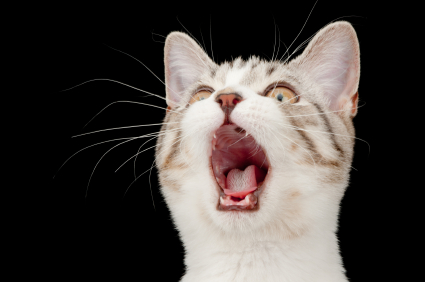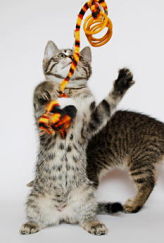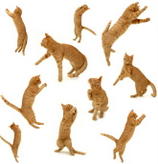Cat Chatter - excessive vocalizing is a feline behavior

We hadn’t had much experience with cat chatter until cat #6 (Giorgio Armani) joined us. He isn’t a purebred and we have no idea what his heritage is except that he has blue eyes and appears to have some Siamese in him. He does chatter like a Siamese.
He vocalizes everything. When he’s running down the stairs to get his dinner (he’s eating downstairs until he’s fully integrated with the other five cats) he jabbers all the way down the stairs. When he’s not happy he makes grumbling sounds. All of this is new to us because we've had calicoes, Himalayans and a tabby.
We've commented how lucky we are that our cats are so quiet and don’t really even meow much. I've always believed that cats get “mind pictures” and they seem to convey their needs to us with a certain stance, a movement toward what they want (once they have our attention) and occasionally a squeak to underline that they need to be noticed. All that has changed with the addition of Giorgio…cat chatter is his forte.
I know that the increase of meowing can be triggered by stressful events like a move or an addition to the household such as another person or animal as well as the lack of exercise and toys…even a window that normally has birds to watch being shuttered.
Cats are inquisitive, intelligent animals with a high prey drive and when many find themselves in a home without much to stimulate them, and no real outlets for their natural behaviors it becomes a source of anxiety for them.
Our Giorgio, who is only a few years old, was kept outside in all weather conditions like snow and rain by the neighbors that owned him and he has a bit of a wild streak in him. However, now when I open the door to allow him to go out, if the sun isn't shining he turns around and comes back in because a warm and dry home is now his preference.
I do this deliberately because I want all my cats to be house-cats that remain indoors but when you take in strays with “street smarts” it takes them a bit of time to realize how good they have it inside.
Max Factor, our black cat, now only scratches the door a couple of times a day to go out for 10-15 minutes. His incentive to return quickly is that I allow him out before he’s been fed. Giorgio isn't motivated by food like Max but he returns quickly to make sure he still has a home that welcomes him…due to his prior experience with the neighbors who let him in infrequently.
Cat chatter can also fall into the category of attention seeking behavior which is common in younger cats. Some cats scream and yell to get attention and while all cats can experience this problem, Oriental breeds (such as Burmese and Siamese) are more prone.
But since Siamese cat chatter by nature, owners need to first distinguish between what’s normal vocalization and what’s not. Cats normally meow for number of reasons, to draw attention to themselves, to identify themselves to a missing member of the group and when they are hungry.
Basically, let the cat tell you what he wants…once. After that, focus on giving him treats when he’s quiet and ignore him when he’s making a lot of noise. If your cat’s meowing changes in frequency or intensity it could signify a problem. This might be accompanied by a reluctance to play, a change in eating habits, or over-grooming to the extent that hair loss is obvious.
If this is the case, an appointment with your vet should be made for a complete physical exam to rule out any underlying medical problems. Chronic pain, Feline Hyperthyroidism, or even a brain tumor can all trigger excessive vocalization.
Assuming your cat is in good health, the first step behaviorists recommend is to change the sleep/wake cycle. Cats don’t keep the same schedule we do. Their times of peak activity are dawn and dust. These natural rhythms are influenced by environmental factors, such as daylight, but also by feeding schedules. That’s why a small amount of their regular food should be given an hour or so before bedtime.
Like humans, cats get sleepy after a meal. Each cat entering into our household slowly adjusted to the routine we had set and each one integrated into that pattern, either slowly or quickly. Another thing to remember is that regular exercise is also important to changing the sleep/wake cycle.
Set aside 10-15 minutes every night (about a half hour before you plan to go to bed) to play with your cat, or as in our case…6 cats. The best way to play with your cats is to work with their natural inclination to stalk and capture things. Just let them slowly stalk a toy for 5 minutes and every time they pounce on it, act like they’re the only cat in the world that could have done that.
Daily play sessions will help your cat burn off extra energy, and will also help strengthen the owner/cat bond. Be careful not to overstimulate the cat or he’ll just wake up more and the cat chatter resumes.
Another option is to enrich the environment by rotating toys, placing pots of grass to nibble in different rooms, setting up a cat tree, or providing a window seat so your cat can view birds outside. Since cats are hunters, their visual system is set up to really key into things that move…so get creative. Some cats enjoy videos specifically made for cats.
If you still are failing to stop the cat chatter you can try a spray bottle with plain old water. When he starts meowing, squirt him. Remember that timing is everything. If the cat meowed and you take time to get the squirt bottle, you will be attempting to discipline him for walking across the floor so keep it handy.
Owners need to be consistent and stay positive. It could take several weeks before an improvement is seen. Our Giorgio is still full of cat chatter and it’s been many months. At least his sessions are less frequent and his sleep/wake cycle has been changed to fit in with the other five cats. He sleeps through the night after he has a snack and a play session.
However, he still jabbers a lot during the day. You may be successful in finding the right solution to stop the cat chatter… with a little research, patience and creative thinking. If nothing seems to work you may want to have your vet recommend an animal behaviorist to assist you.
Related Articles......
Return from Cat Chatter to Cat Health Homepage
Having trouble finding what you need? Cat Health Index & Site Map
OR
Do you have a question to ask?...Questions
OR
Do you have a cat story to share?...Simply click here to go to that page!
Copyright@2010-2020 All rights reserved.Cat-health-detective.com
This website is information only. Consult a veterinarian for medical assistance

"Like Us" on Facebook
or...
"Like Us" here




















